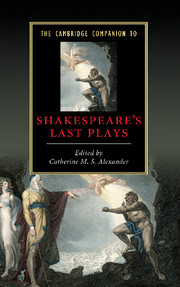Book contents
- Frontmatter
- Introduction
- 1 What is a ‘late play’?
- 2 Blackfriars, music and masque: theatrical contexts of the last plays
- 3 The literary and dramatic contexts of the last plays
- 4 Politics, religion, geography and travel: historical contexts of the last plays
- 5 ‘You speak a language that I understand not’: listening to the last plays
- 6 The Winter’s Tale: shifts in staging and status
- 7 Cymbeline: the afterlife
- 8 Literary invocations of The Tempest
- 9 Pericles: the afterlife
- 10 The Two Noble Kinsmen and King Henry VIII: the last last plays
- Further reading: Clare Smout
- Index
3 - The literary and dramatic contexts of the last plays
Published online by Cambridge University Press: 28 May 2010
- Frontmatter
- Introduction
- 1 What is a ‘late play’?
- 2 Blackfriars, music and masque: theatrical contexts of the last plays
- 3 The literary and dramatic contexts of the last plays
- 4 Politics, religion, geography and travel: historical contexts of the last plays
- 5 ‘You speak a language that I understand not’: listening to the last plays
- 6 The Winter’s Tale: shifts in staging and status
- 7 Cymbeline: the afterlife
- 8 Literary invocations of The Tempest
- 9 Pericles: the afterlife
- 10 The Two Noble Kinsmen and King Henry VIII: the last last plays
- Further reading: Clare Smout
- Index
Summary
Elizabethan and Jacobean drama is an untidy thing, growing from classical roots and also, more importantly, from the allegorical moralities and interludes and the old mystery drama, cycles dramatising the history of the world from Creation to Last Judgement. The experience of those plays, whatever the polite dressing on top, provided the theatrical language of Shakespeare's generation. The mysteries were played in some parts until well into the 1570s, despite Privy Council prohibition. Their mix of highly ritualised performance, grotesque and horrifying suffering and broad vulgar comedy is all held within a frame where the tragedy of Calvary is not the end but the necessary preparation for the moment of Resurrection and the challenge of forgiveness. At the same time a growing body of critical theory, based on Aristotle and his Italian interpreters, was beginning to define tragedy more severely than simply the turning of Fortune's wheel - a concept Shakespeare never, in fact, quite abandons. Comedy recognisably divided into 'City' comedy, using elements of the Roman comedy of Plautus and Terence and based on a money nexus, and romantic comedy, based on 'love will find a way'. But, though he could keep minutely, as in The Tempest, to the three unities if he wished, Shakespeare throughout his career showed scant concern for purist classical generic prescriptions enunciated by critics like Sidney in his Apologie for Poesie, and cheerfully mingles classical dramatic forms with the modes of vernacular drama.
- Type
- Chapter
- Information
- The Cambridge Companion to Shakespeare's Last Plays , pp. 47 - 70Publisher: Cambridge University PressPrint publication year: 2009
- 4
- Cited by

